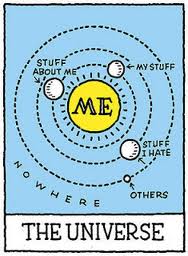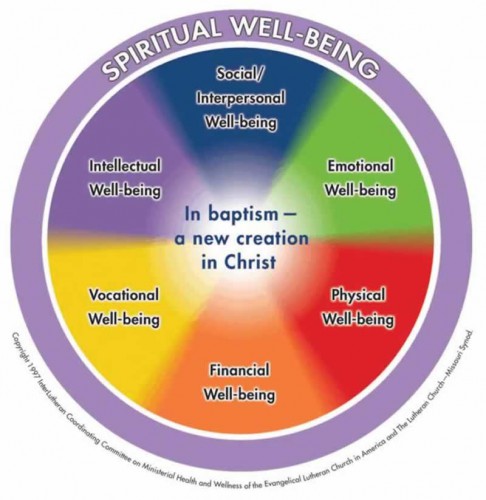
Recently I had the misfortune to fill out an online health assessment provided (one might say required) by my church’s pension plan. The usual lifestyle questions were included: do I sleep well? Not particularly. Do I have a plan to improve my sleep? My firstborn arrives in July. Let’s say no again. How many servings of each of the following do you eat per week? As many as I can cram down my gullet. And so on. I don’t object (much) to an insurance company asking these things. I do object to the odd spiritual language that appeared as the assessment progressed. Do you exercise as part of an integrated plan to improve your well-being, rooted in baptism? As a Rostered Leader, do you attempt to model health in all dimensions of life for your community? Are you aware of how your physical health impacts your social, vocational, financial, emotional, intellectual and spiritual well-being, as expressed in the Wellness Wheel?
It doesn’t take long to see the performancism implicit in the questions (or the very weird picture of Christian ministry). Physical health, rather than being a gift to give thanks for, is a precarious achievement dependent on sustained success in many other areas. Worse still, baptism (and so Christ himself) is taken to underpin this success–is it much of a stretch to infer that my relationship to Christ depends on maintaining this all-encompassing picture of health? I’m a perfectionist of the first order. Get behind me, Satan. Do not tempt me with unconquerable goals.
 Most worrying to me is the idol of health as “wholeness” operating at the center. The concern for wholeness reveals something of our modern narcissism. Each element, on its own, is of course good. There are undoubtedly many complex relationships between them–some synergies, yes, but also trade-offs and competing goods. Do I work more hours or spend more time with my family? Can I afford the vacation I promised to the kids? But far from illuminating those relationships, wholeness erases differences and attempts to unite all good things in me. That the desirable things of life might pull me in opposing directions, that I will have to make painful choices, and even that many things, perhaps the most important things, are not in my power at all–these facts cannot be admitted. The balanced, whole life is assumed to be eminently achievable and identical with my spiritual ambitions.
Most worrying to me is the idol of health as “wholeness” operating at the center. The concern for wholeness reveals something of our modern narcissism. Each element, on its own, is of course good. There are undoubtedly many complex relationships between them–some synergies, yes, but also trade-offs and competing goods. Do I work more hours or spend more time with my family? Can I afford the vacation I promised to the kids? But far from illuminating those relationships, wholeness erases differences and attempts to unite all good things in me. That the desirable things of life might pull me in opposing directions, that I will have to make painful choices, and even that many things, perhaps the most important things, are not in my power at all–these facts cannot be admitted. The balanced, whole life is assumed to be eminently achievable and identical with my spiritual ambitions.
After completing the assessment I posted a complaint about it on Facebook and walked away. Within hours I had comments from an unexpected range of friends; worlds collided. Gamer buddies were going back and forth at length with seminary professors, old friends and present colleagues. How should I explain the fear this caused? The conversation, though it was not about me, threatened to reveal something about me that I cannot countenance: my life does not fit together in a neat, consistent way. It has no simple narrative. I was afraid I might have to interpret Chester to Rolf or Tal to Nadia, afraid that deep disagreements about God and the world might surface, afraid that I might be revealed as inconsistent, perhaps even duplicitous in all this. In fact, everyone played well together and so my fears went unrealized, but this does not mean they were unfounded.
Belief in our own self-consistency is nearly unassailable. It extends not only to personal characteristics–this is who I am–but into how I believe the world hangs together. The difficult issues of our age are fraught precisely because for each one of us they belong to a presumed coherence, a whole. What I believe about economics must fit together with what I believe about politics, which fits with my beliefs about science (say, evolution, climate, sexuality for starters) and my assessment of the character of others who weigh in on these issues–and these things are united precisely in that I think them. That I could be right about some and wrong on others is inconceivable because it implies a fissure in me.
There are no difficult trade-offs, no goods pulling in opposing directions. The latest fad diet is not only healthier, but mysteriously tastes better too. The answers are simple and the truth is one. Consider the neologisms that would not exist were we not so certain that all the things we are for naturally belong together: eco-justice, for example, or perhaps Christian metal. Of course, it may be that these things will fit together in a certain way–but it isn’t obviously so just because I approve of both of them.
It is sometimes observed that our age is materialistic, obsessed with things. I’m not sure this is so. Let me offer a rough definition: a thing is something that isn’t me. I suspect that far from trusting too much in things, we are in fact opposed to things. Things are rigid, with characteristics that resist our summations of them. They may interact in ways we disapprove of. Our true narcissism is that there aren’t things anymore. Just me. Our relation to things is a desire to consume them, to swallow the world, to render them me, and so not things. We trust in things only insofar as we believe we can possess them, merge with them. We cannot delight in them as separate from ourselves, and so we must reconcile them to us, overcome them. They must decrease that I may increase. It is the horrifying realization at the end of Mark Twain’s No. 44, The Mysterious Stranger:
“It is true, that which I have revealed to you: there is no God, no universe, no human race, no earthly life, no heaven, no hell. It is all a Dream, a grotesque and foolish dream. Nothing exists but You. And You are but a Thought–a vagrant Thought, a useless Thought, a homeless Thought, wandering forlorn among the empty eternities!”
He vanished, and left me appalled; for I knew, and realized, that all he had said was true.
 Our relation to the world has become as Gertrude Stein once said of Oakland (though she meant something quite different): there is no there there. As Christians, we should not be surprised by this. We have a word for it, sin, defined as being curved in on oneself. On a recent outing to get a new driver’s license I saw a poster with these words: Register to Vote! Express Yourself. If voting is self-expression, then there is no world, no body politic, no neighbor whose life could be affected by my vote. Politics is the exercise of enlarging myself. The presumption of the poster is that people might not vote unless they are assured that it is exactly this.
Our relation to the world has become as Gertrude Stein once said of Oakland (though she meant something quite different): there is no there there. As Christians, we should not be surprised by this. We have a word for it, sin, defined as being curved in on oneself. On a recent outing to get a new driver’s license I saw a poster with these words: Register to Vote! Express Yourself. If voting is self-expression, then there is no world, no body politic, no neighbor whose life could be affected by my vote. Politics is the exercise of enlarging myself. The presumption of the poster is that people might not vote unless they are assured that it is exactly this.
But it is not that way. There is a world with things of God’s own making. Let the gamer understand: it is no accident that Kirby, who inhales all things, lives in Dream Land. The radically world- and thing-denying nature of sin is perhaps not often enough discussed by Christians. Too often paganism is taken to mean having multiple gods somewhere out there, being too worldly. But I am more pagan by a long shot than my ancestors who made sacrifices to the thunder god on the shores of the Baltic. I sacrifice the world to the god who is in me alone. Christians would do well to heed the pagan Greeks who warned us of looking into the water at our own beauty.
I am not Atlas, and cannot bear the world upon my shoulders. Even less can I contain it within me, and every effort to do so leads only to destruction. There is true grace in having a creator who has made a world that is outside of me and includes me. This creator has given himself as a savior:
He is the image of the invisible God, the firstborn of all creation; for in him all things in heaven and on earth were created, things visible and invisible, whether thrones or dominions or rulers or powers—all things have been created through him and for him. He himself is before all things, and in him all things hold together. He is the head of the body, the church; he is the beginning, the firstborn from the dead, so that he might come to have first place in everything. For in him all the fullness of God was pleased to dwell, and through him God was pleased to reconcile to himself all things, whether on earth or in heaven, by making peace through the blood of his cross. (Colossians 1:15-20)
This is the God who promises himself, who is for you, who gives himself to you to consume–not by your power, but by his promise–and who alone contains, reconciles and holds all things together.

COMMENTS
4 responses to “Everything I Like Fits Together: The Disappearance of Things and the Horror of Containing the Universe”
Leave a Reply















If God has promised himself for the “you” who is not attending the “means of grace” as handed out by a church sanctioned mediator, then the only possible difference between the “you” who goes to the religious dispensary and the one who does not is merely epistemology. But if knowing more and being more sure results in our being less “receptive” to the grace which is going to win in any case, why bother with clergy absolutions?
Romans 6 teaches that one has either died to the law or one has not died to the law. One has been joined to Christ’s death or one has not. But Mockingbird universalism teaches that all sinners have died to the law in Christ, but also teach at the same time that no sinner has completely died to the law yet (the old Adam is dying, they say). Strange—they teach that antinomianism does not really exist, but they remain sure and certain about the reality of legalism existing in all the sinners for whom they say Christ died.
I’m not at all sure what kind of a thing “Mockingbird universalism” might be. I was certainly given no official handbook which included it. Nor did I attend or receive a degree from Mockingbird U. In fact, I’m not at all sure how one would derive universalism from my post.
I take it you object to the categorical nature of God’s promise, and to the simultaneity of the old age with the reality of the new in human experience. I assure you, those things are not Mockingbird inventions. For the first, simply attend to Jesus’ preaching: “Your sins are forgiven.” For the second, perhaps note that Romans 7 follows Romans 6. Thanks for commenting.
In my estimation, those insurance questions are the symptoms of a church denomination who is legalistic and narrowly focused on the third use of the law. How I wish this church body spent its time actually equipping its pastors to preach the gospel by actually preaching gospel to us, rather than telling us how to obey the law better.
Tricia, I don’t think you’re wrong. But it makes it all the more amusing that the target of my ire was a joint product of both the largest Lutheran denominations in the country. My guess is we could all take a close look at our denominations (and ourselves) and see symptoms of the same thing.